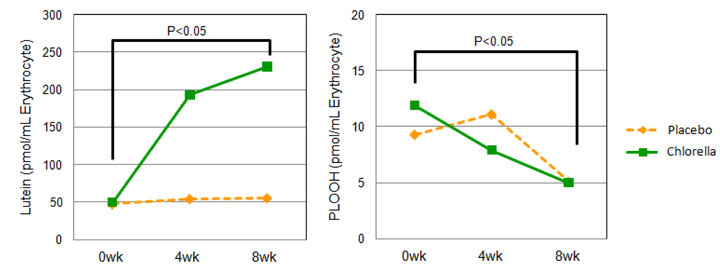- TOP
- List of reports
- The Antioxidant Effect of Chlorella on Erythrocyte Membrane Phospholipids
The Antioxidant Effect of Chlorella on Erythrocyte Membrane Phospholipids
【Scientific information】
Research and Development Department, Sun Chlorella Corporation
The Antioxidant Effect of Chlorella on Erythrocyte Membrane Phospholipids
Published in the Journal of Oleo Science 2013
This report details the results of a published clinical study that established the efficacy of Chlorella in elderly Japanese subjects.
- Study Objectives
- In patients with senile dementia, including those with Alzheimer's disease, an abnormal accumulation of phospholipid hydroperoxides (PLOOH) is observed in the erythrocyte membrane. This condition shows the aging of erythrocytes and it is suspected that aged erythrocytes are associated with decreased oxygen transfer to brain cells, which may contribute to the progress of senile dementia. Chlorella contains a large amount of lutein and has a potent antioxidant effect on the oxidation of erythrocyte membrane phospholipids; therefore, the inhibitory effect of Chlorella ingestion on the oxidation of erythrocyte membrane phospholipids was investigated in elderly Japanese subjects.
- Method of experiments
- A randomized, double-blind, placebo-controlled study was conducted with 12 healthy middle-aged and elderly men and women (age: 50–68 years). The subjects were divided into a Chlorella group and a placebo group (6 subjects for each group). The subjects ingested 8 g (40 tablets daily; 20 tablets in both the morning and in the evening) of either Chlorella or placebo for 8 weeks. To evaluate the effect of Chlorella, the concentrations of lutein and PLOOH in erythrocytes were measured before ingestion, at 4 weeks after the start of ingestion, and at 8 weeks after the start of ingestion.
- Results
- In the Chlorella group, the concentration of lutein in erythrocytes increased by approximately 4.6 times, from 49.7 pmol/mL before ingestion (0 wk) to 230.7 pmol/mL at 8 weeks after the start of ingestion (8 wk). The concentration of PLOOH in erythrocytes of subjects in the Chlorella group showed a significant decrease from 11.9 pmol/mL at 0 wk to 5.0 pmol/mL at 8 wk (P < 0.05). In the placebo group, no significant change was observed in the concentrations of lutein and PLOOH in erythrocytes. There were no adverse events due to Chlorella ingestion.
These results showed that Chlorella may prevent the progress of senile dementia, such as Alzheimer's disease, by inhibiting the accumulation of PLOOH in the erythrocyte membrane, thereby inhibiting the aging of erythrocytes.

Reference of Journal
- Journal:
- Journal of Oleo Science, Vol.62 No.11 (2013)
- Title:
- Ingestion of Chlorella Reduced the Oxidation of Erythrocyte Membrane Lipid in Senior Japanese Subjects
- Authors:
- Miyazawa T1, Nakagawa K1, Takekoshi H2, et al.
- Affiliation:
- 1Tohoku University, 2Sun Chlorella Corporation





